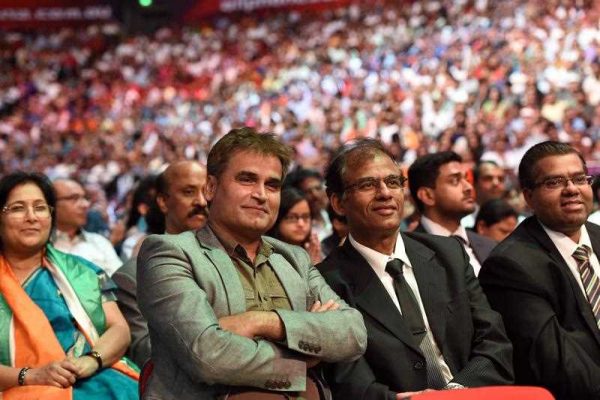Previous governments had recognised the potential diplomatic utility of the Indian diaspora community. In 2004, the Ministry of Overseas Indian Affairs was created to service the diaspora’s interests and facilitate inward remittances, worth close to 4 per cent of India’s GDP and a source of much-needed foreign currency. On overseas visits, Indian ministers would interact with select groups of compatriots, placed highly in business, industry and community organisations, to listen to their concerns and cultivate investment and trade opportunities. But there was no clear and consistent strategy to maintain and leverage this overseas connection to India’s economic and political advantage. The Modi government wants this to change.
Modi understands the immense potential of the 25 million diaspora to contribute to India’s development from a country still largely on the periphery to being at the centre of global politics. Besides business leaders, Modi is also engaging with Indian professionals who have excelled in areas including science, technology, engineering and medicine. The Indian diaspora has responded to Modi’s vision, evident in the rousing reception Modi received both at Madison Square in the US and in Sydney following the G20 summit. Modi continues his call for Indians settled abroad to contribute to his vision of a ‘new India’ when he travels abroad. This is a new phenomenon in Indian diplomacy, drawing in critical new actors and ideas to grow and shape India’s links beyond its borders.
The other new instrument of Modi’s diplomacy is subnational governments — both state and city administrations. Their involvement in international affairs is not new. Those in industrialised developed nations, including Australia and Japan, have actively engaged in wide-ranging aspects of international affairs including trade, culture, sports and education, and at times even in formal diplomacy.
Even before assuming the prime ministership, Modi as Chief Minister of Gujarat had supported a greater role for state governments in foreign affairs, especially with regard to commercial links. As Chief Minister, Modi visited a number of countries in East Asia, most prominently Japan and China, to woo wealthy investors. The annual ‘Vibrant Gujarat Summit’ helped Gujarat attract significant foreign investment from business people around the world. In August 2013, a Queensland delegation had met Modi to build closer ties with Gujarat. This link is likely to continue to strengthen with Modi as prime minister, with Modi promoting India–Queensland linkages while attending the G20 summit in Australia in November. India has now become Queensland’s fourth-largest export destination.
Since becoming prime minister, Modi has reiterated that subnational governments have a pivotal role to play in foreign affairs, especially in the economic field. For direct foreign investment as well as for his ‘Make in India’ initiative, Modi has sought the cooperation of state governments from all sides of India’s political spectrum. This call was unthinkable previously, as the national government firmly maintained a monopoly on all aspects of foreign affairs, hesitating at or even hindering state governments’ engagement with foreign governments.
At a reception organised by Queensland Premier Campbell Newman during the G20, Modi noted the importance of city-state ties, welcoming the sister-city relationship between the southern Indian city of Hyderabad and Queensland’s capital city of Brisbane. A similar agreement was signed some months earlier in Japan between Varanasi, Modi’s electoral constituency, and Kyoto. Such international partnering agreements are new to India and still very limited in number. But there is no doubt that the role of subnational governments in Indian foreign policy will increase as a consequence of the changing nature of India’s political and economic landscape.
Connecting with the Indian diaspora and decentralising diplomacy can operate in tandem to help shape the ‘new India’. Indian states need to reach out to Indian communities overseas. This approach to building subnational linkages via the diaspora is just one element of a much more comprehensive and creative foreign policy Modi is pursuing.
It remains to be seen how positively and effectively subnational governments and the Indian diaspora respond to Modi’s call to contribute to a new India. But a good start has been made, and if successful it will add a vibrant new dimension to India’s foreign policy.
Purnendra Jain is Professor in Asian Studies at the University of Adelaide. Tridivesh Singh Maini is a Senior Research Associate with The Jindal School of International Affairs, OP Jindal Global University, India.

